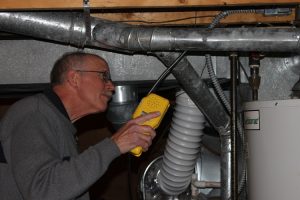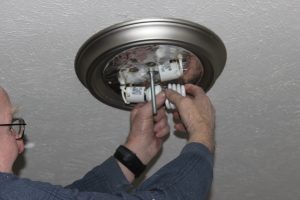Living Sustainably: Manage your house for more comfort, lower energy bills
By Peter Boogaart, City of Holland Residential Energy Adviser
In the commercial/industrial sector, every building has a supervisor, someone who is  responsible for managing the way it functions. When something is wrong — no heat, broken window, lights out — you call the “super.”
responsible for managing the way it functions. When something is wrong — no heat, broken window, lights out — you call the “super.”
In the residential sector, every house – and there are 7,500 single family homes in Holland – has a “super” too. It just happens to be you, the homeowner. OK, true – but most of us never took a Building Management course, and the house didn’t come with an owner’s manual.
So, what should we do to manage our homes most efficiently?
First, monitor your building. Supers get reports. Today those reports are digital and happen in real time. Homeowners get reports too. They’re called utility bills. Yes, you have to pay it, but the real value is in the data. How many therms of gas, kWh of electricity or gallons of water are you using? How does your run rate compare with an energy efficient home? With a wi-fi thermostat, much of this information can be digital too. Some homeowners are installing dashboards which give them real-time monitoring.
Second, whatever your technology, begin with an audit. You need to know your baseline. The Holland Board of Public Works can help. Access their online tool (find the Home Energy Use Calculator in the pulldown at www.hollandbpw.com/my-home) and calculate your energy use number. Think of it as the miles-per- gallon for your house; low numbers are better.
 Third, take an inventory. Go room to room and write down everything that uses electricity. How many light bulbs? Are they LED? Are your electronics and entertainment equipment on smart surge protectors? Are your major appliances Energy Star rated? Ask yourself, “Do I need it? Could it be unplugged?” You may not need to change anything, but you won’t know that without an intentional review.
Third, take an inventory. Go room to room and write down everything that uses electricity. How many light bulbs? Are they LED? Are your electronics and entertainment equipment on smart surge protectors? Are your major appliances Energy Star rated? Ask yourself, “Do I need it? Could it be unplugged?” You may not need to change anything, but you won’t know that without an intentional review.
Next check your mechanical equipment. Do you have a high-efficiency furnace and a schedule for changing the furnace filter? Efficient air conditioning? Check your hot water tank – is it set for 120°F, the most efficient temperature?
Fourth, listen to the family. Complaints are data. Cold rooms? Big bills? Drafty? They’re telling you where the problems are!
If the problems are significant, you may need diagnostic help from a certified building analyst. The technician will check all your systems and run a pressurization test. Think of it like your checkup with your doctor. If you live in the city, Holland’s Home Energy Retrofit program can walk you through the process. There are incentives and funding available through the On-Bill Loan program. Go to www.hollandenergyfund.com to check out the options.
Buildings are as variable as people. Some are more efficient than others. Be a smart super for your house and keep it running efficiently.
Peter Boogaart is the residential energy adviser for the City of Holland and assists homeowners with energy efficiency issues.
PHOTO CUTLINES –
PETER TESTING.JPG – Peter Boogaart, Holland’s residential energy advisor, checks a furnace for leaking emissions.
EFFICIENT LIGHTS.JPG – Installing efficient light bulbs is one of the things a smart homeowner can do to cut back energy use.
![]() This Week’s Sustainability Framework Theme:
This Week’s Sustainability Framework Theme:
Smart Energy: We need to use both conservation and efficiency measures to manage our resources to provide access to reliable and cost-effective energy.
Living Sustainably is a collection of community voices sharing updates about local sustainability initiatives. It is presented by the Holland-Hope College Sustainability Institute, a joint project of Hope College, the City of Holland and Holland Board of Public Works. Go to www.hope.edu/sustainability-institute for more information.


